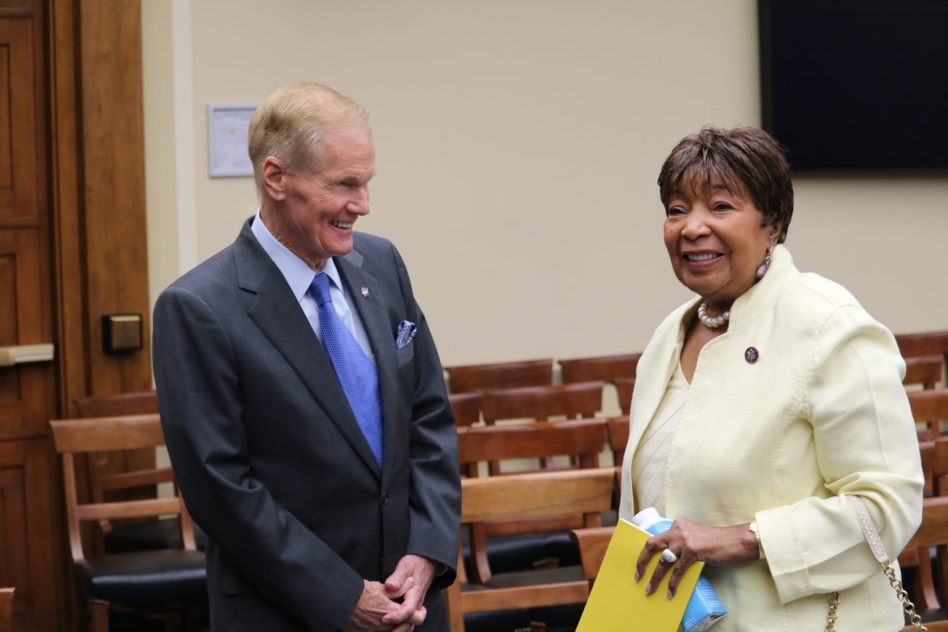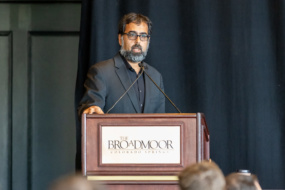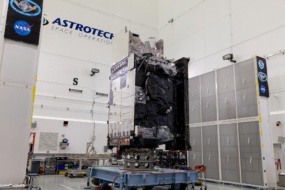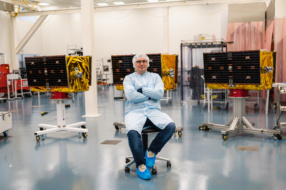Figuring out how the US remains a leader in low Earth orbit after the ISS plummets into the ocean should be a top priority for Congress in 2023, according to outgoing Science, Space and Technology Committee chair Rep. Eddie Bernice Johnson (D-TX.)
There are no follow-on plans for a government-run space station in low Earth orbit after NASA retires the ISS in 2030. Instead, commercial providers like Axiom Space and Nanoracks are building commercial space stations where the government can be a customer alongside space tourists, film crews, and others who want to conduct experiments in microgravity.
“Ensuring a U.S. presence in low Earth orbit and a seamless transition to alternate platforms following the end of ISS operations will also require congressional attention, because this transition will be challenging, and we need to get it right,” Johnson, who is retiring in December after 15 terms on Capitol Hill, told Payload.
Johnson made history during her almost 30-year tenure on the Science, Space, and Technology Committee, including becoming the first African American and the first woman to lead the panel. But the achievements she’s most proud of are including getting NASA priorities into the CHIPS Act and her work on commercial space regulations, she said.
Younger lawmakers with growing space interests in their home districts are ready to be champions for NASA in her absence, Johnson predicted. But she also stressed that members need to remember how much investments in space benefit terrestrial life, from GPS to weather forecasting to communications.
“As they wrestle with competing priorities, I hope my colleagues in Congress don’t lose sight of just how much exploring the frontiers of space benefits us here at home,” she said.
Johnson answered some questions in writing about her proudest space achievements as leader of the committee, whether she’ll be hitching a ride to orbit any time soon, and what’s next for her after leaving Congress.
How did you first become interested in space?
As a lifelong Texan, which is home to the NASA Johnson Space Center, and as a long-term member of the Committee on Science, Space, and Technology prior to becoming chairwoman, I have always been a strong supporter and advocate for NASA and the U.S. space program. My interest has also been strengthened by the way in which space inspires our young people to pursue STEM education, giving them the skills that will be critically important for our continued progress.
What achievement are you proudest of as chair of the Science, Space and Technology Committee?
With respect to space, I am proud that we were able to get core policy priorities for the NASA Authorization Act of 2022 into the CHIPS and Science Act. NASA has inspiring goals, and we were able to provide policies to support NASA in achieving those goals and continuing to deliver awe-inspiring results into the future. I’m also proud of the oversight the committee has carried out on NASA and commercial space, which is an important role of the authorizing committee.
As the space tourism industry starts to take off – would you go to space if given the opportunity?
Space involves risk and I’m thankful for our NASA astronauts’ willingness over the past six decades to launch into space and work there in the interest of advancing our nation’s space program. Space tourism, on the other hand, is in its infancy. While I hope that it will prove successful, it is a long way from being routine. I’ll happily remain an observer back here on Earth.
NASA has so many major missions on its plate from returning humans to the moon to bringing samples from Mars back to Earth. What are you most excited about?
I’m thrilled that the James Webb Space Telescope’s performance is surpassing expectations, and I know we will learn more than anticipated from this incredible facility. I’m very excited for the Artemis 1 mission, because it is an important first step in returning America to the Moon enroute to Mars. Will the Mars Sample Return mission tell us if life was or is detected on Mars? I can’t wait to find out. The reality is that NASA is pursuing a host of incredibly important and challenging space activities, and I am excited by them all!
What do you think is the most misunderstood thing about space among your colleagues in Congress?
Space has become an integral part of our daily lives; in fact, we rely heavily on space data and services. Space R&D led to GPS, improved weather forecasting, satellite communications, precision agriculture and advanced imaging technologies, to name just a few examples. As they wrestle with competing priorities, I hope my colleagues in Congress don’t lose sight of just how much exploring the frontiers of space benefits us here at home.
What areas in space do you hope Congress and the committee focus their attention in 2023?
It’s essential that for something as monumental as the Moon to Mars program, we need to ensure that NASA will be on a strong path to success. I hope the Congress and committee continue to do the oversight needed for Congress to have confidence that the United States, with its partners, will have a viable Moon to Mars program.
Ensuring a U.S. presence in low Earth orbit and a seamless transition to alternate platforms following the end of ISS operations will also require congressional attention, because this transition will be challenging, and we need to get it right. Space situational awareness and space sustainability are central to promoting space safety, especially with the rapidly increasing number of satellites and spacecraft in orbit, and this is a topic on which our subcommittee has been working. Commercial space is growing, and policies regarding safety, regulations, spectrum and more will need attention to ensure its continued success.
What are the biggest things you see still on Congress’ to-do list?
As I mentioned, I want to ensure we have a civil space situational awareness capability that promotes space safety and informs steps toward a framework for space traffic coordination. Ensuring our sustained research in low Earth orbit, and avoiding a gap in U.S. operations there, following the end of ISS operations, must be a priority. We also need to determine an appropriate framework for authorizing and supervising novel space missions.
Are you worried at all about what it means for NASA to be losing you as an advocate for the space industry on Capitol Hill?
While I consider myself a strong advocate for space, I’m pleased that I don’t stand alone in that regard. Many of my colleagues on the committee and in Congress are equally strong supporters of NASA. We’re fortunate that space has bipartisan support, and I am confident it will continue to have that support into the future.
Who do you see as some of the more junior, newer space voices we could expect to step in and fill that void?
With space’s growing footprint, an increasing number of members may have already or soon have space-related interests in their districts, whether commercial, academic, or government. I am encouraged that we will continue to have leaders in Congress to sustain a strong U.S. space program.
STEM has been a big priority for you in Congress. How optimistic are you that the US can close the gap with China and encourage more young Americans to pursue careers in science, technology and space?
Promoting STEM and our country’s R&D capacity is not primarily about competing with China. Our future wellbeing as a nation will depend critically on developing the people, the organizations, and the infrastructure to bring the innovation of our scientists and engineers to fruition. That’s one of the reasons that the enactment of the CHIPS and Science Act is so important.
Our talented youth and professionals are attracted to bold, challenging, and inspiring goals. We need to show them we are serious about authorizing the funds and enacting the policies that will help them to realize those goals. And we need to ensure that the STEM workforce of the future is an inclusive and diverse one, so that we can take advantage of all our nation’s brainpower. If our young people feel inspired, invited, and included, our nation’s STEM capacity will continue to strengthen and grow.
What’s next for you after Congress? Do you have to stay involved with space priorities?
I am looking forward to spending more time with my family and will remain committed to advancing our space priorities in whatever capacity I can.




